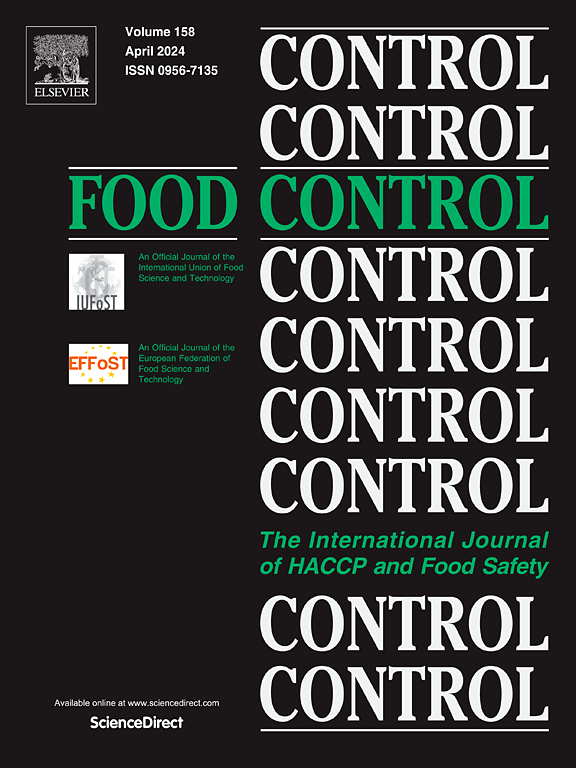食品安全文化要素之间的关系:串联调解模型
IF 5.6
1区 农林科学
Q1 FOOD SCIENCE & TECHNOLOGY
引用次数: 0
摘要
如今,食品安全文化(FS-culture)已被广泛认为是影响食品安全结果的一个关键因素,从而推动了这一领域的广泛研究。虽然以往的研究探讨了食品安全文化的要素和益处,但对这些要素之间的关系关注有限。本研究旨在通过考察沟通、管理制度和流程以及工作环境在领导力和承诺--食品安全文化的两个关键要素--之间关系中的中介作用来弥补这一不足。研究利用巴西 37 家餐饮企业 471 名食品从业人员的数据,对串行中介模型进行了测试。餐饮文化是通过一份包含 31 项指标的自填式问卷进行评估的,其中评估了五个核心要素:1)领导力;2)沟通;3)管理系统和流程;4)环境;5)承诺。使用 PROCESS 宏进行了中介分析。结果表明,领导力间接影响承诺,其影响通过涉及沟通、管理制度和流程以及工作环境的连续过程进行中介。沟通、管理制度和流程以及工作环境直接对承诺产生积极影响。序列中介模型说明了所调查的金融服务文化要素之间的关系,强调了培养强大的金融服务文化的整体方法的重要性。旨在改善金融服务文化的干预措施应优先考虑领导力发展、加强沟通策略、实施稳健的管理制度和流程,以及营造支持性的工作环境。未来的研究需要探索这些发现在不同文化和组织背景下的普遍适用性,从而更广泛地了解各种环境下金融服务文化的驱动机制。本文章由计算机程序翻译,如有差异,请以英文原文为准。
The relationship of food safety culture elements: A serial mediation model
Nowadays, food safety culture (FS-culture) is widely acknowledged as a critical factor influencing food safety outcomes, prompting extensive research in this domain. Although previous studies have explored the elements and benefits of FS-culture, limited attention has been given to the relationship among these elements. This study aims to address this gap by examining the mediating role of communication, management systems and processes, and the work environment in the relationship between leadership and commitment - two key elements of FS-culture. A serial mediation model was tested using data from 471 food handlers across 37 Brazilian food service establishments. FS-culture was assessed using a self-administered questionnaire comprising 31 indicators, which evaluated five core elements: 1) leadership, 2) communication, 3) management systems and processes, 4) environment, and 5) commitment. Mediation analysis was conducted using PROCESS macro. The results suggest that leadership indirectly influences commitment and its effect is mediated through a sequential process involving communication, management systems and processes, and the work environment. Commitment is positively and directly affected by communication, management systems and processes, and the work environment. The serial mediation model illustrates the relationship between the investigated FS-culture elements, underscoring the importance of a holistic approach to fostering a strong FS-culture. Interventions aimed at improving FS-culture should prioritise leadership development, enhance communication strategies, implement robust management systems and processes, and cultivate a supportive work environment. Future research is warranted to explore the generalisability of these findings across diverse cultural and organisational contexts, providing a broader understanding of the mechanisms driving FS-culture in various settings.
求助全文
通过发布文献求助,成功后即可免费获取论文全文。
去求助
来源期刊

Food Control
工程技术-食品科技
CiteScore
12.20
自引率
6.70%
发文量
758
审稿时长
33 days
期刊介绍:
Food Control is an international journal that provides essential information for those involved in food safety and process control.
Food Control covers the below areas that relate to food process control or to food safety of human foods:
• Microbial food safety and antimicrobial systems
• Mycotoxins
• Hazard analysis, HACCP and food safety objectives
• Risk assessment, including microbial and chemical hazards
• Quality assurance
• Good manufacturing practices
• Food process systems design and control
• Food Packaging technology and materials in contact with foods
• Rapid methods of analysis and detection, including sensor technology
• Codes of practice, legislation and international harmonization
• Consumer issues
• Education, training and research needs.
The scope of Food Control is comprehensive and includes original research papers, authoritative reviews, short communications, comment articles that report on new developments in food control, and position papers.
 求助内容:
求助内容: 应助结果提醒方式:
应助结果提醒方式:


